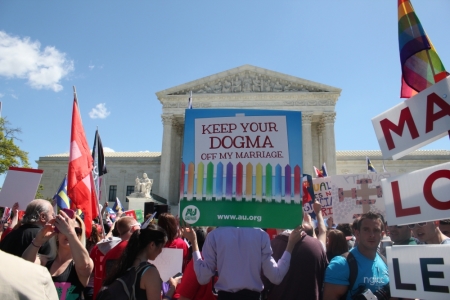How Will the Supreme Court Gay Marriage Decision Affect Religious Freedom?

If the Supreme Court rules in favor of gay marriage, its effect on religious freedom will depend upon how the opinion is written, according to experts.
The best possible outcome for religious freedom would be for the court to rule that the U.S. Constitution does not require all states to redefine marriage to include same-sex couples. If the court does require all states to redefine marriage, however, there are a range of options that could affect religious freedom differently.
If the court were to "elevate sexual orientation to a protected category similar to race," Erik Stanley, senior legal counsel with Alliance Defending Freedom, told The Christian Post that could have a detrimental impact on the religious freedom of groups and people who do not believe that same-sex marriage is actually marriage.
Equally troubling for religious freedom, he added, would be for the court to say that opposition to same-sex marriage is motivated by animus, as Justice Anthony Kennedy suggested in two prior decisions. Kennedy is expected to write the opinion in this month's gay marriage case.
In Romer v. Evans, which struck down a Colorado amendment prohibiting special legal status based upon sexual orientation, Kennedy wrote that the amendment was "inexplicable by anything except animus."
And in one of last year's gay marriage decisions, United States v. Windsor, Kennedy wrote that a law prohibiting federal recognition of gay marriage, the Defense of Marriage Act, placed a "stigma" upon same-sex couples and was motivated by "improper animus" and a "desire to harm a politically unpopular group."
In his dissent, Justice Antonin Scalia criticized Kennedy for not providing evidence that the bipartisan Congress and President Bill Clinton were driven by hatred of gays when they passed the law.
"Laying such a charge against them should require the most extraordinary evidence, and I would have thought that every attempt would be made to indulge a more anodyne explanation for the statute," Scalia wrote.
John Inazu, associate professor of law and political science at Washington University School of Law in St. Louis, argued, at a recent Faith Angle Forum, that the decision's effect on religious freedom is more related to the language used in the opinion than the actual legal reasoning. He offered Kennedy's use of the word "animus" as an example.
"My sense is, more than the precise legal grounds it's going to be words like 'animus' and 'bigotry.' Whether those words are included or not in the opinion is going to drive the downstream religious liberty challenges," he said during a Q&A.
When asked for clarification, Inazu acknowledged that the court's legal reasoning should be more important than the emotional weight of the language it uses, but argued that the reality is quite different.
When the Supreme Court issues an opinion, he explained, "there are legal consequences and there are cultural signals that follow," and, "the rhetorical framing of the analysis will make a big difference [for religious freedom], I think, downstream."
"The Supreme Court has a lot of moral authority, and moral authority that plays out in the words [it uses] as well as [its] doctrinal arguments," Inazu said.
If the court does redefine marriage for the whole country, Stanley added, the best possible outcome for religious freedom would be if the decision is written in a way that acknowledges there are different principled viewpoints to marriage. He used Planned Parenthood v. Casey as an example. In that opinion, which was co-written by Kennedy, the court acknowledged there are deeply held views on both sides of the abortion debate.
"At the heart of liberty is the right to define one's own concept of existence, of meaning, of the universe, and of the mystery of human life," the opinion read.
Stanley Carlson-Thies, founder and senior director of the Institutional Religious Freedom Alliance, also encouraged the court, if it does choose to redefine marriage, to write the opinion in a manner that maximizes religious freedom.
The court should "specifically remind legislators and government officials that they are duty bound to protect the free exercise of religion, including when religion shapes the operations and services of faith-based organizations like schools, adoption agencies, religious counseling programs, and residential facilities," he wrote Thursday. "And then federal, state, and local officials can set about the challenging, but essential, task of protecting institutional religious freedom in light of same-sex marriage."
While some pastors and religious leaders have recently promised civil disobedience if the court redefines marriage, Stanley does not believe that would be necessary in the foreseeable future. Pastors, for instance, will not be required to perform same-sex weddings, and churches will not be required to allow same-sex ceremonies on their property.
Churches and para-church groups "still have great constitutional protections," he reminded.
Stanley does, however, encourage churches and other Christian groups to better protect themselves from potential lawsuits by making sure they have formal statements regarding their beliefs about marriage, and those statements are included, for instance, in employment criteria, facility use policies, and mission statements.
ADF and the Southern Baptist Ethics & Religious Liberty Commission created a guidebook to help churches, Christian schools and Christian ministries fashion such statements. You can download a free copy here.
Carlson-Thies has similar advice for faith-based groups.
"Whatever the Supreme Court rules, the most important action that faith-based organizations must take is to examine their stated and unstated policies and practices and make sure that these are aligned with and rooted in the religious convictions they claim to be guided by. This is important legally: a religious organization cannot easily claim religious freedom protections for its countercultural ways if it is not evident to judges and other observers that those countercultural ways are due to its religious convictions," he wrote.




















